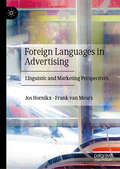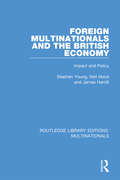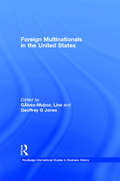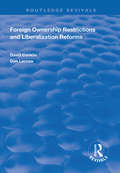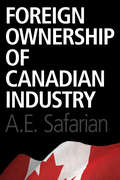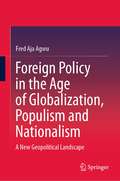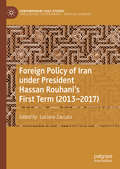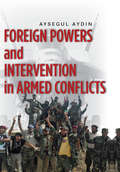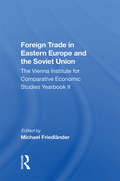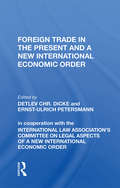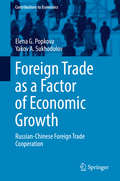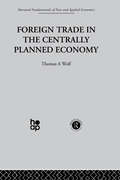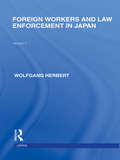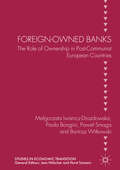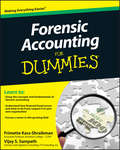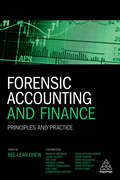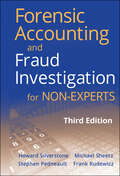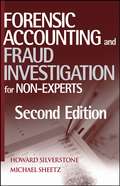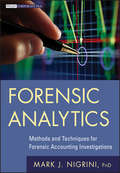- Table View
- List View
Foreign Languages in Advertising: Linguistic and Marketing Perspectives
by Jos Hornikx Frank van MeursThis book presents a comprehensive account of the use and effects of foreign languages in advertising. Based on consumer culture positioning strategies in marketing, three language strategies are presented: foreign language display to express foreignness, English to highlight globalness, and local language to appeal to ethnicity (for instance, Spanish for Hispanics in the USA). The book takes a multidisciplinary approach, integrating insights from both marketing and linguistics, presenting both theoretical perspectives (e.g., Communication Accommodation Theory, Conceptual Feature Model, Country-of-origin effect, Markedness Model, Revised Hierarchical Model) and empirical evidence from content analyses and experimental studies. The authors demonstrate that three concepts are key to understanding foreign languages in advertising: language attitudes, language-product congruence, and comprehension. The book will appeal to students and researchers in the fields of sociolinguistics, applied linguistics, psycholinguistics, marketing and advertising.
Foreign Multinationals and the British Economy: Impact and Policy (Routledge Library Editions: Multinationals)
by Stephen Young Neil Hood James HamillThis book, first published in 1988, examines the impact of multinational companies on the British economy and the British government’s policy responses. It assesses the effects of multinationals both on the national economy and on different regions and evaluates the benefits and problems brought by overseas companies. It looks at how government has attempted to entice multinationals to invest, and the UK government’s success in these attraction efforts as compared with other countries. Regulatory aspects of policy are also reviewed and evaluated, and consideration is given to possible new policy approaches. This title will be of interest to students of business studies.
Foreign Multinationals in the United States: Management And Performance (Routledge International Studies in Business History)
by Geoffrey Jones Lina Gálvez-MuñozIn this volume, leading scholars in international business and business history in the United States, Europe and Japan examine the experiences of a range of firms in the United States. They survey British, Canadian, French, German, Spanish and Japanese firms, and span a range of sectors including automobiles, banking, electricals, petroleum and steel. Together, their contributions present a unique evolutionary and comparative perspective on the management and performance of foreign companies in the United States since 1945.This book is essential reading for all those with a professional or academic interest in international business, management, business history or business in the United States.
Foreign Ownership Restrictions and Liberalization Reforms (Routledge Revivals)
by David Conklin Don LecrawPublished in 1997, this volume examines why foreign investment restrictions put in place during the 1950s and 1960s have been largely removed in recent years. Illustrations from ten countries are used to demonstrate the liberalizing movement, and the author analyzes the differences among sectors with regard to rationales and changes in rationales suggesting why many societies have chosen to retain certain restrictions even with the general liberalization. On this basis recommendations are presented in the book with regard to alternative mechanisms for achieving the original national objectives.
Foreign Ownership of Canadian Industry
by A. E. SafarianForeign ownership is an ongoing national policy issue for Canadians, and a matter of utmost concern in the public mind. Recently, the issue has been hotly debated in sectors as diverse as telecommunications, mining, technology, retail, steel, and aerospace.Foreign Ownership of Canadian Industry, A.E. Safarian's classic investigation into the behaviour of branch-plant firms in Canada, has proven an enduring and important analysis of this national policy problem and is now back in print. This third edition of Foreign Ownership of Canadian Industry features a new preface contextualizing Safarian's influential work against contemporary economic issues and policies. As the question of foreign takeovers becomes increasingly critical not only in Canada but in other countries as well, Safarian emphasizes the continuity of concerns over who owns a country's industries.
Foreign Ownership: When Hosts Change the Rules
by Sushil Vachani Dennis J. EncarnationIn an effort to retain more corporate earnings, exercise more managerial control, and meet demands of local constituents, governments worldwide are seeking greater domestic ownership of foreign subsidiaries within their borders. A study of corporate responses to India's Foreign Exchange Regulation Act of 1973 (FERA) shows that multinational corporations facing forced equity dilutions have at least four strategic options available: strict compliance, exit, negotiation, and preemptive action. Certain practical considerations limit management's strategic options: the implications of setting a precedent, the corporation's decision-making structure, the level of bargaining power, the political climate, and management's own biases.
Foreign Policy in the Age of Globalization, Populism and Nationalism: A New Geopolitical Landscape
by Fred Aja AgwuThis book propounds the thesis that it was the dysfunction of globalization and liberalism that prompted the rise of nationalism and populism. Recent developments in global affairs are challenging assumptions and the basis upon which international relations, as a broad field of specialization, and foreign policy analysis, as a sub-field, rests. In a world that is changing in fundamental and irreversible ways, this book intervenes to enable an improved sense of understanding of these developments and what they mean for people-people, state-state, continent-continent, and global relations, moving forward. The author shows anti-globalization and the growth of nationalism and populism have been particularly necessitated by the failures of liberalism and America’s abdication from the world. With reference to Brexit, the pandemic, the US 2020 elections and consequent shifts in power, with a focus on their respective impacts on Africa, and Africa-Sino relations particularly, and developing countries, more broadly, this book situates these discussions within a global context. It effectively illustrates the insufficiency of the West’s soft power, especially as it is foisted or supposedly imposed on the rest of the world without regard to the demands of cultural relativity. Relevant to postgraduate students, researchers, and policymakers, this is must-read within the fields of international relations and political economy.
Foreign Policy of Iran under President Hassan Rouhani's First Term (Contemporary Gulf Studies)
by Luciano ZaccaraThe book deals with President Hassan Rouhani’s conceptual approach to foreign policy. It discusses the main pillars of thinking underpinning Rouhani’s administration and the school of thought associated with it, with a focus on issues pertaining to development as well as international relations. The signature of the “Joint Comprehensive Plan of Action” in 2015 showed the Iranian commitment towards the international requests on guarantees and transparency on its nuclear enrichment program. The book analyses the actual impact of the nuclear deal on the Gulf regional politics, with especial emphasis on the Iran-Saudi Arabia balance of power and the internal implications at political and economic level. It will assess the success or failure of the nuclear deal JCPOA as a foreign policy tool and it impact for Iran and the region. The book also analyses Iran’s relations with other gulf Arab states, Latin America, Africa and its ‘war on terror’ along with its allies Syria and Iraq.
Foreign Powers and Intervention in Armed Conflicts
by Aysegul AydinIntervention in armed conflicts is full of riddles that await attention from scholars and policymakers. This book argues that rethinking intervention-redefining what it is and why foreign powers take an interest in others' conflicts-is of critical importance to understanding how conflicts evolve over time with the entry and exit of external actors. It does this by building a new model of intervention that crosses the traditional boundaries between economics, international relations theory, and security studies, and places the economic interests and domestic political institutions of external states at the center of intervention decisions. Combining quantitative and qualitative evidence from both historical and contemporary conflicts, including interventions in both interstate conflicts and civil wars, it presents an in-depth discussion of a range of interventions-diplomatic, economic, and military-in a variety of international contexts, creating a comprehensive model for future research on the topic.
Foreign Private Investment in Developing Countries
by International Monetary FundA report from the International Monetary Fund.
Foreign Reserve Adequacy in Sub-Saharan Africa
by Paulo Drummond Anubha DhasmanaA report from the International Monetary Fund.
Foreign Trade In Eastern Europe And The Soviet Union: The Vienna Institute For Comparative Economic Studies Yearbook Ii
by Michael FriedländerThis second yearbook of The Vienna Institute for Comparative Economic Studies presents studies dealing with the economic situation in Eastern Europe and the Soviet Union. Its foreign trade analysis offers insights into the ongoing transition process from centrally planned to market-oriented systems.
Foreign Trade In The Present And A New International Economic Order
by Ernst-Ulrich Petersmann Detlev Chr. DickeThis book includes a collection of papers on surveys of topics under consideration in the Uruguay Round of trade negotiations, analysis of topics of traditional concern to developing countries, and a few theoretical papers on the role of law in the international trading system.
Foreign Trade as a Factor of Economic Growth
by Elena G. Popkova Yakov A. SukhodolovThis book analyzes the evolution of foreign trade cooperation between Russia and China in the context of the rapidly growing global economy, especially in the Asian-Pacific region. The approach presented in the book is characterized by a comprehensive view on macroeconomic dynamics and the process of evolving means of production. The authors describe characteristics of national innovational economies with examples from countries in the Asian-Pacific region.
Foreign Trade in the Centrally Planned Economy
by T. WolfAnalyses the main institutional and policy determinants of the foreign trade behaviour of a centrally planned economy and studies factors that affect the level and pattern of foreign trade.
Foreign Workers and Law Enforcement in Japan (Routledge Library Editions: Japan)
by Wolfgang HerbertThis is a detailed study of the extent to which an increased influx of foreign workers is a threat to law and order in the context of the data-generating process of police statistics and the media coverage of "crimes" committed by foreigners. It shows that a general mood in which foreign workers are viewed as potential danger to Japanese society "protects" the criminalization of foreign "illegal" migrant workers. The work begins by tracing the upsurge of "illegal" foreign workers in Japan. It builds a social profile of these "illegals" showing that because of fear of expulsion, lack of knowledge of the law and over-dependence on employer and workplace, their ability to avail themselves off the protection of the law is neglible, and they are always at risk of becoming victims to multiple exploitation.
Foreign and Domestic Investment in Argentina
by Alison E. PostPolitical economy scholarship suggests that private sector investment, and thus economic growth, is more likely to occur when formal institutions allow states to provide investors with credible commitments to protect property rights. This book argues that this maxim does not hold for infrastructure privatization programs. Rather, differences in firm organizational structure better explain in the viability of privatization contracts in weak institutional environments. Domestic investors - or, if contracts are granted subnationally, domestic investors with diverse holdings in their contract jurisdiction - work most effectively in the volatile economic and political environments of the developing world. They are able to negotiate mutually beneficial adaptations to their contracts with host governments because cross-sector diversification provides them with informal contractual supports. The book finds strong empirical support for this argument through an analysis of fourteen water and sanitation privatization contracts in Argentina and a statistical analysis of sector trends in developing countries.
Foreign-Owned Banks: The Role Of Ownership In Post-communist European Countries (Studies In Economic Transition Ser.)
by Małgorzata Iwanicz-Drozdowska Paola Bongini Paweł Smaga Bartosz WitkowskiThis book provides an in-depth analysis of the role of foreign-owned banks for credit growth, financial stability and economic growth in the post-communist European countries. Using data covering 20 countries over the period from 1995 to 2015, the authors analyse the evolution of banking sectors in CESEE after the transformation in the historical context. This helps draw a new picture of the role of financial development and EU accession in that region, being also a lesson for other countries or regions in transition. Additionally, as the Global Financial Crisis has left a stigma in banking sectors, the book shows its impact on the post-communist banking sectors. As the foreign banks dominate the banking sectors in CESEE countries (the stake of foreign-owned banks is below 50% of assets in only five out of 20 countries), their strategies materially impact the development of CESEE banking sectors, which warrants our scientific exploration.Arriving at a clear concluding point of view on the role of foreign-owned banks and providing insights for future policy of CESEEs towards foreign presence in their banking sectors, this book should be of interest to academics, students, and policymakers.
Foremostco, Inc. (A)
by David M. Upton Virginia A. FullerDescribes the rocky transition from an outdated, nonintegrated information system to a new customized system built by programmers in a small, IT-dependent foliage company that distributes plant material. The old system has increasingly become a "burning platform," but the project to build the new system is plagued by delays, the idiosyncrasies of the business, and lack of IT knowledge on the part of senior managers. The transition threatens to put the company out of business, and the crisis forces the COO to take charge of the project personally. After the new system goes live, however, it proves to be buggy and unreliable. The company comes even closer to collapse, and COO Penny Roberts must rally the team around an unpopular project whose success no one can guarantee. Teaching points include IT systems transition, IT management in small companies, and how to deal with an IT-based, business-interrupting disaster.
Forensic Accounting For Dummies
by Vijay S. Sampath Frimette Kass-ShraibmanA practical, hands-on guide to forensic accountingCareers in forensic accounting are hot-US News & World Report recently designated forensic accounting as one of the eight most secure career tracks in America., Forensic accountants work in most major accounting firms and demand for their services is growing with then increasing need for investigations of mergers and acquisitions, tax inquiries, and economic crime. In addition, forensic accountants perform specialized audits, and assist in all kinds of civil litigation, and are often involved in terrorist investigations. Forensic Accounting For Dummies will track to a course and explain the concepts and methods of forensic accounting.Covers everything a forensic accountant may face, from investigations of mergers and acquisitions to tax inquiries to economic crimeWhat to do if you find or suspect financial fraud in your own organizationDetermining what is fraud and how to investigateWhether you're a student pursuing a career in forensic accounting or just want to understand how to detect and deal with financial fraud, Forensic Accounting For Dummies has you covered.
Forensic Accounting and Finance: Principles and Practice
by Bee-Lean ChewA complete guide to Forensic Accounting and Finance, this book is ideal for advanced-level students and new or mid-level forensic accounting professionals looking to boost their specialist knowledge as part of their CPD, for accountants who wish to build more knowledge in this skills area or advanced undergraduates who feel ready to stretch themselves. Demand for expertise in this field is growing, and Forensic Accounting and Finance offers a complete, accessible and affordable guide, combining coverage of principle theory with the real and practical needs of the professional. Written by a strong academic and practitioner author team and in association with the Network for Independent Forensic Accountants, this book covers all forensic accounting topics from forensics as an extension of auditing and the basic principles of forensic accounting, to financial analysis and modelling, financial reporting, financial crime, and IT systems. Forensic Accounting and Finance shares current examples and case studies, highlighting cultural differences for key topics with updated regional legislation information available online for those looking for a truly global approach which is always up to date.
Forensic Accounting and Fraud Investigation for Non-Experts
by Howard Silverstone Michael Sheetz Stephen Pedneault Frank RudewiczFully revised, the proven primer on forensic accounting with all-new cases A must-have reference for every business professional, Forensic Accounting and Fraud Investigation for Non-Experts, Third Edition is a necessary tool for those interested in understanding how financial fraud occurs and what to do when you find or suspect it within your organization. With comprehensive coverage, it provides insightful advice on where an organization is most susceptible to fraud. Updated with new cases and new material on technology tools in forensic accounting Covers the core accounting, investigative, and legal aspects of forensic accounting for professionals new to the field Covers investigative and legal issues along with accounting schemes Written by a team of recognized experts in the field of forensic accounting, Forensic Accounting and Fraud Investigation for Non-Experts, Third Edition is essential reading for accountants and investigators requiring the most up-to-date methods in dealing with financial fraud within their organizations.
Forensic Accounting and Fraud Investigation for Non-Experts
by Howard Silverstone Michael SheetzA must-have reference for every business professional, Forensic Accounting and Fraud Investigation for Non-Experts, Second Edition is a necessary tool for those interested in understanding how financial fraud occurs and what to do when you find or suspect it within your organization. With comprehensive coverage, it provides insightful advice on where an organization is most susceptible to fraud.
Forensic Analytics: Methods and Techniques for Forensic Accounting Investigations (Wiley Corporate F&A #558)
by Mark J. NigriniWith over 300 images, Forensic Analytics reviews and shows how twenty substantive and rigorous tests can be used to detect fraud, errors, estimates, or biases in your data. For each test, the original data is shown with the steps needed to get to the final result. The tests range from high-level data overviews to assess the reasonableness of data, to highly focused tests that give small samples of highly suspicious transactions. These tests are relevant to your organization, whether small or large, for profit, nonprofit, or government-related.
